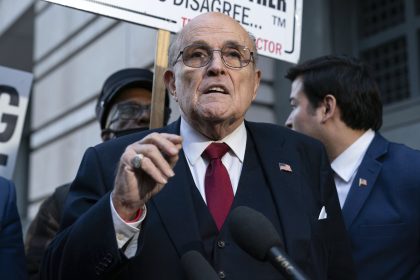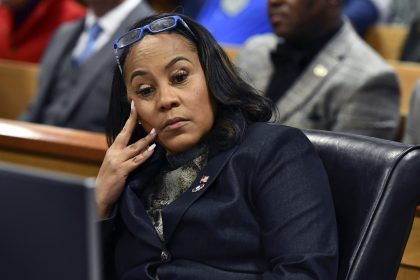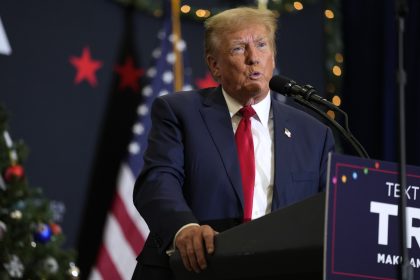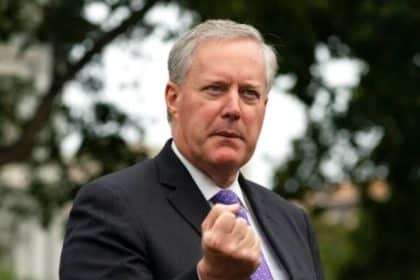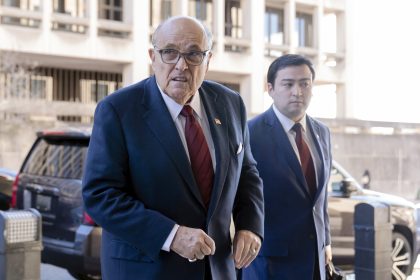For 2020 Election, States Debate Who’s Allowed to Vote
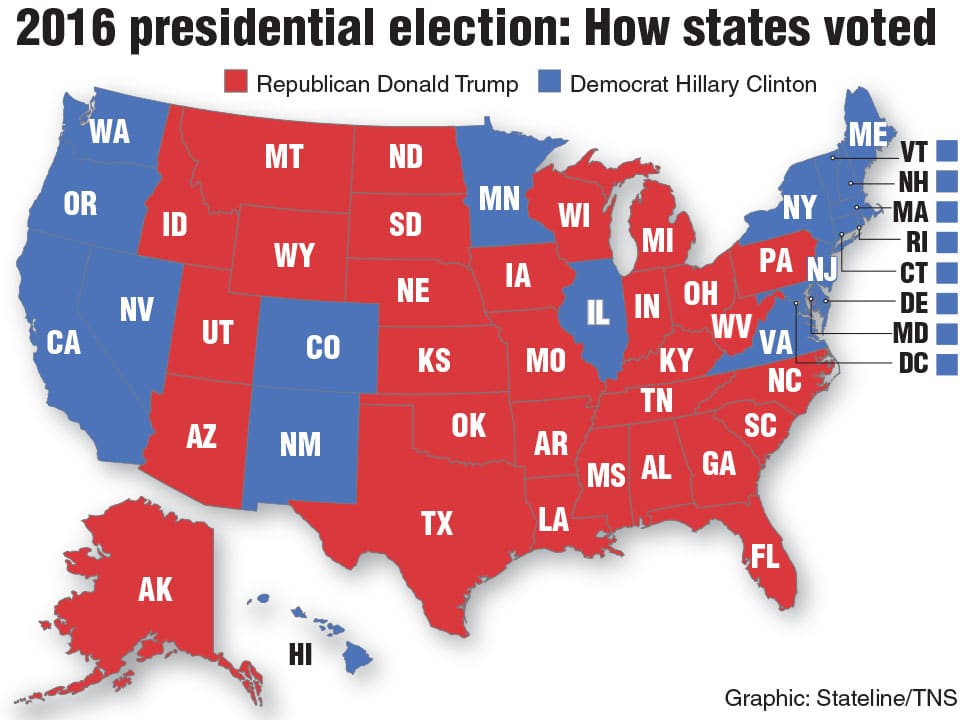
WASHINGTON — The 2020 presidential election is just months away and state legislators, courts and election officials are making final changes to policies governing access to the ballot.
States remain divided along partisan lines on expanding and tightening voting laws. In Democratic-controlled states, lawmakers are going even further this year in enfranchising formerly incarcerated felons, expanding early voting and implementing automatic voter registration.
But in Republican-controlled states, lawmakers are shuttering polling places on college campuses and imposing new rules on students who want to vote; limiting early voting and vote-by-mail opportunities; and adding new voter ID requirements. Voting rights groups are suing to prevent many of those laws from going into effect before November.
Any changes to ballot access, especially in pivotal swing states, could shape the outcomes in November, said Wendy Weiser, director of the Democracy Program at the Brennan Center for Justice at New York University’s School of Law.
“It’s going to be a big year that’s going to be focused on election systems,” she said. “There’ll be a lot of changes between now and the election.”
Where Democrats have made substantial legislative gains in the past two years, lawmakers have made expanding ballot access a top priority.
In New York, for example, where Democrats took control of the state Senate for the first time in a decade in 2018, legislators last year passed a series of measures that made voting more accessible, including the adoption of early voting and voting by mail.
But lawmakers want to do more. Earlier this month, the state Senate passed legislation that would bring automatic voter registration to the Empire State, while also expanding early voting locations and days.
Senate Democrats wanted to make sure this was their first order of business in 2020, said Elections Committee Chairman Zellnor Myrie, a Democrat who is expecting an “unprecedented” level of turnout in November.
“This election is probably the most consequential election of our lifetimes,” Myrie told Stateline. “We want to make sure that the process, both to register and to vote, is as easy and accessible as possible.”
Some GOP lawmakers oppose the legislation, saying it would open the door to the accidental registration of undocumented immigrants, who in New York can apply for driver’s licenses.
Republican state Assemblyman Colin Schmitt, who led the opposition to similar legislation last year, said he worries about security and the financial burden of expanding registration. “It’s not written in a way to truly protect the integrity of elections,” Schmitt said. “We really don’t know what the safeguards are going to be.”
If passed by the Democratic-controlled state Assembly and signed by Democratic Gov. Andrew Cuomo, the new system, which would register people to vote whenever they interact with the Department of Motor Vehicles or other agencies, would go into effect in two years.
Last year, six states — Maine, Maryland, Massachusetts, Michigan, Nevada and Washington — passed or implemented similar automatic voter registration measures.
In Virginia, where Democrats gained control of the state legislature in November, Democrats will try to expand the early voting period to 45 days and make Election Day a state holiday.
And elsewhere, lawmakers in several states are looking to restore the right to vote for people with felony records. Legislators in Hawaii, Michigan and Oregon made it easier to vote by mail.
While the New Hampshire legislature passed a measure that would have allowed no-excuse absentee voting in the state, Republican Gov. Chris Sununu vetoed it in September.
Republicans steadfastly oppose similar measures, based on worries that ineligible voters may cast ballots and swing an election.
In Republican-led states, GOP lawmakers and officials continue to tighten voting laws in the name of election integrity.
In Alabama, lawmakers last year added new voter ID requirements for residents who would vote absentee, while lawmakers in Nebraska this year will attempt to add voter ID requirements.
These add to significant Republican efforts over the past decade, during which 30 states expanded voter ID laws and voter registration purges were commonplace.
In states Republican President Donald Trump needs to win to secure a second term, such as North Carolina and Wisconsin, Democrats and voting rights groups have taken their voting policy fights to court, challenging conservative-backed restrictions.
Just before the New Year, U.S. District Judge for the Middle District of North Carolina Loretta Biggs struck down a Republican-backed voter ID law in North Carolina, arguing that it was created with “discriminatory intent” toward minority voters.
“North Carolina has a sordid history of racial discrimination and voter suppression stretching back to the time of slavery, through the era of Jim Crow, and, crucially, continuing up to the present day,” she wrote in her 60-page ruling.
The constitutional requirement, which was ratified by North Carolina voters in 2018 and supported by some Democrats in the state legislature, was the state’s second attempt in the past decade to get a voter ID law on the books. In 2016, a federal appeals court struck down a 2013 law, ruling that the measure was written to racially discriminate.
North Carolina Attorney General Josh Stein, a Democrat, announced earlier this month that he would appeal the federal court ruling after the state’s March presidential primary to “avoid any further voter confusion.” Laura Brewer, a spokeswoman for Stein, would not explain his reasoning for appealing the ruling. In a previous filing, Stein said the law was “the will of NC voters.”
Joseph Kyzer, communications director for Republican Speaker of the House Tim Moore, said he’s confident the law will eventually go through. “We certainly feel it’s important to fulfill the state constitutional requirement to have a voter ID law like 34 other states have,” he told Stateline.
But Aylett Colston, the political action chairwoman of the Raleigh-Apex NAACP chapter, called it “a very deliberate, intentional, thought-out plan to make it more difficult for some people to vote.”
Colston said the law, combined with Republican-backed redistricting and the cutting back of early voting hours and sites, could create voter confusion and longer lines, and ultimately depress voter turnout.
“People should pay attention to North Carolina,” she said. “We are a swing state and we’re growing. Whatever happens here with voting rights is going to impact the rest of the country.”
In Wisconsin, efforts to keep voter rolls clean by purging people who may have moved to another state have been met with confusion, lawsuits and a fear that officials’ methods may tip the scales in the presidential election.
Using data from an interstate partnership called the Electronic Registration Information Center (a nonprofit founded with the financial help of The Pew Charitable Trusts, which also funds Stateline) to determine who might have moved, the Wisconsin Election Commission in October sent letters to 232,000 voters asking that they update their registration information. Voters were given six election cycles to indicate they had moved.
But some people thought the purge should have been immediate, including the Wisconsin Institute for Law and Liberty, a conservative voter integrity law firm, which filed a motion in state court, demanding the election commission remove every voter who received the letter and failed to respond in 30 days.
“It seems to me that given the relatively small number of people who could be inconvenienced that this is a rather modest effort to maintain the accuracy of the voter rolls,” Rick Esenberg, the group’s president, told Stateline. “The accuracy of the voter rolls is not some type of partisan plot. It is something that is mandated by the law.”
State law does not require the commission to deactivate voters within a certain period, said Reid Magney, a spokesman for the state election commission who fears a purge could hurt voters. But that assertion remains in dispute. A state appeals court earlier this month blocked the state from purging voter rolls.
The commission is also taking fire from the opposite end of the political spectrum. The efforts by the commission didn’t go far enough to inform people of the consequences of not responding to the mailer, said Michelle Kanter Cohen, a counsel for the Fair Elections Center, which is suing the state to prevent a voter purge. List maintenance is important, she said, but it shouldn’t be burdensome for people who vote absentee or have disabilities.
Many people may feel that any changes to voter rolls or election policy in the battleground state could potentially affect the outcome of the presidential election, said Barry Burden, director of the University of Wisconsin-Madison’s Elections Research Center. Similar purges in Ohio and Georgia in the past year met fierce opposition.
Keeping voter rolls clean through the interstate data partnership has been “highly successful,” he said, but not perfect. Any imperfections, Burden said, could cause confusion and controversy.
There are legal challenges in several other states. In Florida, voting right groups are suing the state over measures that make it more difficult to vote on college campuses.
In Wisconsin, voting rights groups filed a lawsuit late last year challenging the state’s new restriction that would bar using student IDs at polling places. Republican lawmakers in Arizona, too, are trying to restrict the use of student IDs. College students in Iowa have had a difficult time trying to meet the standards of the Hawkeye State’s new voter ID requirements, with many confused by delays in sending out new voter cards for students with out-of-state IDs.
A lawsuit in New Hampshire to block a new Republican-backed voter residency requirement failed in federal court, while a lawsuit that challenges Texas’ strict early voting laws is still active in federal court.
To counter the continuing threat of foreign meddling, states also are buying new election equipment with a paper trail, training election workers on security protocols and adding new security measures to voter registration databases and other systems.
In October, Pennsylvania invested $90 million in new election equipment that creates a paper trail and allows elections to be audited.
In 2018, more than 80% of Pennsylvania voters cast their ballots on paperless machines that were old and vulnerable to hacks, according to the Pennsylvania-based nonprofit Verified Voting, which advocates for a verified paper trail in election machines.
Local election officials and poll workers still need further training on this new election equipment, preelection testing and post-election audits, said Chris Deluzio, policy director for the University of Pittsburgh Institute for Cyber Law, Policy and Security, who testified before the Pennsylvania Senate on the need for new voting systems.
“Most counties have had no experience on paper ballots,” he said. “This is a new endeavor. If we’re not careful about securing paper ballots, there could be a risk to public trust.”
Other states, including Georgia, North Dakota and Ohio, are rolling out new voting machines ahead of this year’s elections with the help of new federal aid. Local election officials across the country were pleased to see Congress invest an additional $425 million in election security grants in the most recent spending bill. But that was not enough, many say.
“One-time lump sum funds every so often is helpful, but we need more than that,” said Democratic Vermont Secretary of State Jim Condos this month at an Election Assistance Commission summit in Washington, D.C. “We actually need to have some kind of annual sustainable and dedicated funding.”
———
©2020 Stateline.org
Visit Stateline.org at www.stateline.org
Distributed by Tribune Content Agency, LLC.

















